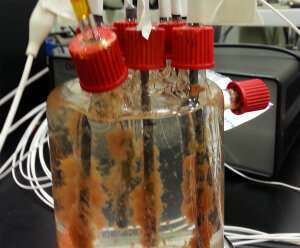Photo of anammox on electrodes. Credit: Dario Rangel Shaw KAUST
Anammox bacteria can be persuaded to generate electricity from wastewater if they are grown on electrodes in the absence of nitrite. The finding is the result of new research carried out by microbiologists at Radboud University, in collaboration with colleagues from the US and Saudi Arabia, published in Nature Communications. It's the final piece of the puzzle in a long scientific investigation by lead researcher Mike Jetten.
Anammox bacteria are known all over the world for their ability to turn ammonium into nitrogen without using any oxygen. For a long time, scientists considered this an impossible reaction. The anammox bacteria that can do this were discovered 25 years ago, and they're actually quite common in canals, oceans and on sea floors.
Anammox bacteria are now used all over the world in water purification systems to remove hazardous ammonium from wastewater. Because this method requires so much less oxygen, it's very energy efficient and therefore more sustainable than standard methods of water purification.
Electricity from wastewater
Another possible use of this bacteria has also emerged. "When one substance is turned into another, bacteria can release electrons, and you can then use those to produce electricity. So our question was: can we persuade anammox bacteria to generate electricity from wastewater?" says Mike Jetten, professor of ecological microbiology at Radboud University.
The answer was yes. Ordinarily, when ammonium is broken down, electrons are released, which are then used by the bacteria to break down nitrite. By gradually reducing the quantity of nitrite, the researchers forced the anammox bacteria to dispose of the electrons from ammonium in some other way. "Using special metal electrodes, we were able to capture the released electrons in a mini-reactor, and then run them through electrical wiring. And sure enough, eventually the electricity metre surged," says Jetten.
"Although the anammox bacteria are capable of performing this reaction, it's not their preferred activity," says Jetten. Converting ammonium in this way takes about five times longer than the normal scenario, where nitrite is available. "And if nitrite is available, the bacteria would much rather use it."
Jetten, working with Caroline Slomp from Utrecht University (UU) and a team of researchers, will be using an ERC Synergy Grant to carry out further research into whether anammox bacteria can perform the same reaction in natural environments, such as on the sea floor. "There may be other organisms in these places that can perform this reaction even better," says Jetten. "We'll also be looking into how exactly these reactions can take place. Having made this initial finding, more research is needed into how the reaction might eventually be applied on a large scale."
More information: Dario R. Shaw et al. Extracellular electron transfer-dependent anaerobic oxidation of ammonium by anammox bacteria, Nature Communications (2020). DOI: 10.1038/s41467-020-16016-y
Journal information: Nature Communications
Provided by Radboud University
























